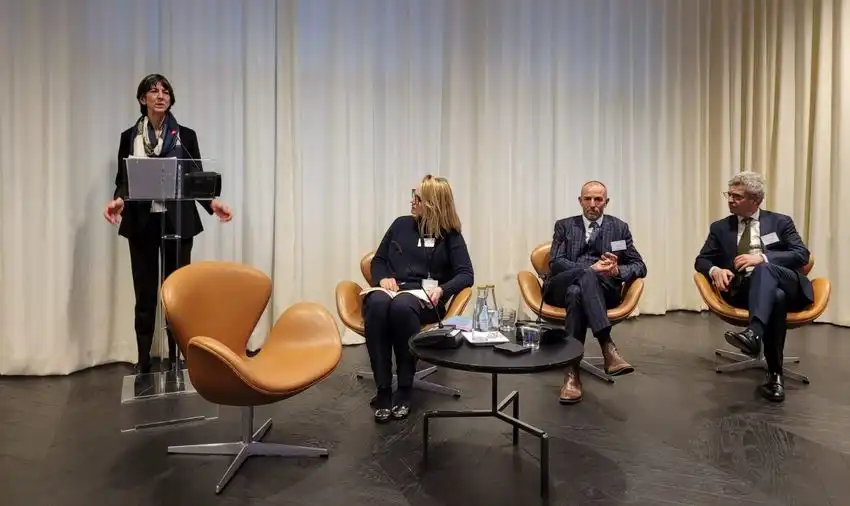Home>IA vs. AI: Genuine Arbitration in the Time of Artificial Intelligence
07.04.2022
IA vs. AI: Genuine Arbitration in the Time of Artificial Intelligence

Lucy Reed delivered her keynote lecture as the inaugural Bredin Prat Distinguished Visiting Scholar on 9 March 2022 in hybrid format, with the in-person event being held at the offices of Bredin Prat. Speaking to an audience of senior and junior arbitration specialists, including Bredin Prat partners Marina Weiss, Laura Fadlallah, Tim Portwood and José María Pérez, she opened her address highlighting the grave violations of international law following Russia’s invasion of Ukraine.
Turning to her topic, Lucy Reed built upon Henry Kissinger’s warning that artificial intelligence marks the end of the Age of Enlightenment. The underlying idea to this warning is that humanity has introduced a type of non-human intelligence capable of producing knowledge beyond human understanding. With that in mind, Reed drew attention to the fact that humans are no longer the superior thinkers on earth. Such a proposition, she recognised, was an uncomfortable one, especially if one considers that artificial intelligence, for all its cognitive power and potential, is not equipped with morality or ethics.
Against this background, Lucy Reed explored the impacts of artificial intelligence on international arbitration. Evidently, she noted, AI is and will increasingly be a useful tool for data-driven elements of international arbitration, including e-discovery, proofreading, translation and legal research. Conversely, it was Reed’s opinion that AI is not likely to be good at predicting outcomes in international commercial arbitration, for the confidentiality of awards creates a considerable obstacle for machine learning.
That said, the main takeaway of her address was that AI is not likely to replace international arbitral tribunals, as the core mandate of arbitrators is to provide clear reasoning for their decisions. Such a task, she noted, was beyond the scope of AI, which solves complex problems in ways that escape our own understanding of how the solution was reached. In particular, and in order to stay true to this mandate, she cautioned against the adoption of mechanistic precedential reasoning in investment arbitration, urging arbitrators and counsel alike to engage in genuine legal reasoning.
The audience listened attentively to Lucy Reed’s insights, and at the end posed a number of questions, including one on the role of motivation in small and medium-size arbitrations, raised by Professor George Bermann, Sciences Po visiting faculty member from Columbia University, who was in attendance. Also among the attendants was Arias Lim Jie, who is a current TADS LLM candidate and a recipient of the Bredin Prat Excellence Grant. She shared her views of the event with us:
I really enjoyed the lecture as it offered us a glimpse into what the future of arbitration could be as artificial intelligence as a dispute resolution tool grows more prevalent in its use. As a young practitioner, Prof. Reed's conférence and instruction offered me significant food for thought on how I should adapt my practice in future. More importantly, it is a useful reminder of what are the inimitable human aspects of arbitration, which will continue to be valuable even as technology develops.
With the closure of Q&A, the conversation continued at the offices of Bredin Prat where a cocktail was graciously hosted by the firm.
The Bredin Prat Distinguished Visiting Scholarship allowed the LLM in Transnational Arbitration and Dispute Settlement (TADS) at Sciences Po Law School to host Lucy Reed for an intensive period of instruction. Over the course of two weeks, she delivered the 24h course "Advanced Practicum in International Arbitration” and the 4h seminar “Mediation and Conciliation of State Level Disputes".
Information Sessions: Masters

Find out more about the Masters programs and the wide choice of specialisations offered by the 8 Schools of Sciences Po during our webinars dedicated to applicants.